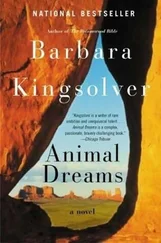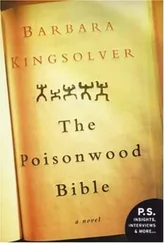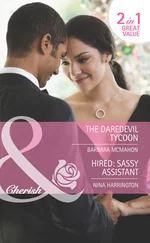Every surface was covered: tables, chairs, walls. Over the fireplace there was a big cross made up of hundreds of small, brightly glazed pieces of tile, each one shaped like something: a boy, a dog, a house, a palm tree, a bright blue fish. Together they all added up to a cross. I had never seen anything like it.
The wall across from the fireplace was covered with pictures of every imaginable size and shape. There were snapshots of people squinting into the sun, a few studio portraits of children, pictures of Mattie flanked by other people, all of them dark and shorter than herself. There were a number of children’s drawings. I remembered Mattie telling me when we’d first met that she had “something like” grandchildren around, how that had struck me as such a peculiar thing to say.
I noticed that practically all the kids’ drawings had guns in them somewhere, and huge bullets suspended in the air, hanging on the dotted lines that flowed like waterfalls out of the gun barrels. There were many men in turtle-shaped army helmets. One picture showed a helicopter streaming blood.
The living room had no windows, just doors opening off in four directions. An older woman came in with a cardboard box and looked at me with surprise, asking something in Spanish. I had never before seen anyone whose entire body looked sad. Her skin just seemed to hang from her, especially from her arms above the elbows, and her jaw.
“Esperanza,” I said, and she nodded toward a door at the back.
That room seemed to belong in another house-it was empty. The walls were an antique-looking shade of light pink, completely bare except for a cross with two palm fronds stuck behind it, over one of the beds. The two beds were neatly made up with rough-looking blue blankets that surely no one would sleep under in this weather. Esperanza was not in either bed, but sitting up in a straight-backed chair by the window. She looked up when I knocked on the door casement.
“Hi, I came to see how you were doing.”
She got up from the chair and offered it to me. She sat on the bed. I don’t believe she had been doing anything at all, just sitting with her hands in her lap.
We looked at each other for a second, then looked at other things in the room, of which there were painfully few. I didn’t know why I’d thought I’d have the nerve to do this.
“How are you feeling now? Are you feeling better? Your stomach’s okay?” I put my hand on my stomach. Esperanza nodded, then looked at her hands.
I had lost my directions somewhere when I came into the house. I looked out the window expecting to see Roosevelt Park, but this was not that window. We were at the back of the house. From here you got a terrific bird’s-eye view of Lee Sing’s back garden. I wondered if you might catch a peek at Lee Sing’s old mother from up here, if you stayed at your post long enough.
“I’ve been meaning to tell you,” I said, “I think Esperanza’s a beautiful name. Estevan told me it means to wait, and also to hope. That in Spanish the same word means both things. But I thought it was pretty even before I knew it meant anything. It reminded me of, I don’t know, a waterfall or something.”
She nodded.
“Taylor doesn’t mean anything that interesting. A tailor hems up people’s pants and stuff like that.”
Her mouth stretched a little bit in the direction of a smile. But her eyes looked blank. Dark, black holes.
‘You understand basically everything I’m saying, right?”
She nodded again.
“I think that’s how Turtle is, too, but people always forget. They think she doesn’t take in any more than she puts out, but I know better, I can tell she understands stuff. It’s something about the way she looks at you.”
Esperanza kept staring at her empty hands. I wished I had something to put in them, something that would be wonderful for her to look at.
“I hope you don’t mind me talking about Turtle.”
Her eyes flew up at me like a pair of blackbirds scared out of safe hiding.
“Estevan told me about Ismene,” I said. “I’m sorry. When I first found out you’d taken pills, I couldn’t understand it, why you’d do such a thing to yourself. To Estevan. But when he told me that. God, how does a person live with something like that?”
She looked away. This conversation would have been hard enough even with two people talking. No matter what I said, it was sure to be the exact wrong thing to say to someone who recently swallowed a bottle of baby aspirin. But what would be right? Was there some book in the library where you could look up such things?
“I guess the main thing I came up here to tell you is, I don’t know how you go on, but I really hope you’ll keep doing it. That you won’t give up esperanza. I thought of that last night. Esperanza is all you get, no second chances. What you have to do is try and think of reasons to stick it out.”
She had tears in her eyes, but that seemed better somehow than nothing at all. “It’s terrible to lose somebody,” I said, “I mean, I don’t know firsthand, but I can imagine it must be. But it’s also true that some people never have anybody to lose, and I think that’s got to be so much worse.”
After a long time I said, “He’s crazy about you.”
I went over and took one of the hands in her lap and held it for a second. Her skin felt cold and emptied-out, like there was nobody home.
As I left to go back to work I saw the woman with the cardboard box, still in the living room. She was sorting through a handful of possessions she had laid out on the sofa-a black skirt, a small book bound in red vinyl, a framed photograph, a pair of baby’s sneakers tied together by the laces-and carefully putting them back into the box.
On Wednesday, just as I was finishing up the last patch of the day and getting ready to head for home, I spotted Lou Ann stepping off the bus at the Roosevelt stop. I yelled for her to wait up, and she came over and talked to me while I used the water hose to wash the black dust off my hands. One thing I can tell you right now about tires: they’re dirty business.
Lou Ann had just been for a job interview at a convenience store on the north side. She’d left Turtle and Dwayne Ray with Edna and Mrs. Parsons.
“So the first thing the guy says to me is ‘We get a lot of armed robberies in here, sweetheart.’ He kept on calling me sweetheart and talking to my boobs instead of my face, this big flabby guy with greasy hair and you just know he reads every one of those porno magazines they keep behind the counter. ‘Lots of stickups, sweetheart, how do you hold up under pressure?’ he says. Holdup, that was his idea of a big hilarious joke. Jeez, the whole thing gave me the creeps from the word go.”
I could see that she had dressed up for this interview: a nice skirt, ironed blouse, stockings, pumps. In this heat. The humiliation of it made me furious. “Something better’s bound to come along,” I said. “You can hold out.” I wiped my hands on a towel, hollered goodbye to Mattie, and we headed down the sidewalk.
“I hate that place,” she said, nodding back over her shoulder at Fanny Heaven.
‘Yeah,” I said. “But on the bright side, Mattie says they don’t do a whole lot of business. She thinks having a place called Jesus Is Lord right next door kind of puts a hex on it.”
Lou Ann shuddered. “That door’s what gets me. The way they made that door handle. Like a woman is something you shove on and walk right through. I try to ignore it, but it still gets me.”
“Don’t ignore it, then,” I said. “Talk back to it. Say, ‘You can’t do that number on me you shit-for-brains,’ or something like that. Otherwise it kind of weasels its way into your head whether you like it or not. You know those hard-boiled eggs they keep around in jars of vinegar, in bars? It’s like that. After a while they get to tasting awful, and it’s not the egg’s fault. What I’m saying is you can’t just sit there, you got to get pissed off.”
Читать дальше












